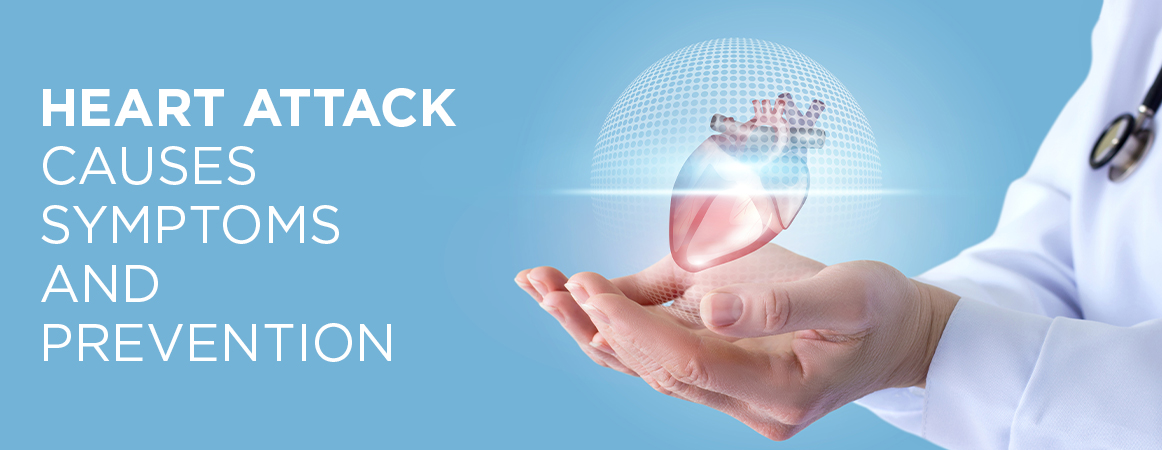Heart Attack: Causes, Symptoms and Prevention
A heart attack, often referred to as a myocardial infarction, happens when the blood supply to a portion of the heart is cut off, harming the heart muscle. It is a serious and potentially life-threatening condition that requires immediate medical attention.
Causes of Heart Attack
The most common cause of a heart attack is coronary artery disease, which occurs when the arteries that supply blood to the heart become narrowed or blocked by a buildup of plaque. This plaque can build up over time on the inside walls of arteries and is composed of cholesterol, fat, and other substances.
Other factors that can increase the risk of a heart attack include high blood pressure, smoking, diabetes, obesity, and a sedentary lifestyle. A family history of heart disease can also increase a person’s risk of having a heart attack.
Understanding Risk Factors
There are several risk factors for heart attacks that you cannot change, such as your age, family history, and gender. However, there are also many modifiable risk factors that you can address to reduce your risk. These include:
High Blood Pressure
High blood pressure puts extra strain on the heart and increases the risk of heart attacks.
High cholesterol
High levels of cholesterol in the blood can lead to the formation of plaque in the coronary arteries, which can increase the risk of heart attacks.
Diabetes
People with diabetes are at a higher risk for heart attacks because high blood sugar levels can cause damage to the blood vessels.
Smoking
Smoking increases the risk of heart attacks by damaging the arteries and increasing blood pressure.
Obesity
Being overweight or obese increases the risk of heart attacks due to factors such as high blood pressure, high cholesterol, and diabetes.
Physical Inactivity
Physically inactive people are at a higher risk for heart attacks because they may have higher blood pressure, high cholesterol, and a higher risk of obesity.
Seeking Medical Help
If you have any of the above risk factors or have a family history of heart attacks, it’s important to see a healthcare provider regularly to monitor your risk and receive any necessary treatment. This may include medications to lower blood pressure or cholesterol, or lifestyle modification recommendations.
Symptoms of Heart Attack
The most common symptoms of a heart attack include chest pain or discomfort, shortness of breath, nausea, vomiting, and pain in the arms, neck, jaw, or back. Some people may also experience dizziness, lightheadedness, or a rapid or irregular heartbeat.
It is important to note that not all heart attacks present with the same symptoms, and some people may not experience any symptoms at all. This is particularly true for women, who may be more likely to have “silent” heart attacks that go unnoticed. Consult a female cardiologist in Karachi at MMI Hospital if you think you are at risk.
Prevention of Heart Attack
There are several steps that people can take to reduce their risk of having a heart attack. These include:
Maintaining A Healthy Diet
Eating a diet rich in fruits, vegetables, whole grains, and lean protein can help to lower cholesterol and blood pressure. Limiting intake of saturated and trans fats, salt, and added sugars can also help to reduce the risk of a heart attack.
Getting Regular Exercise
Engaging in at least 150 minutes of moderate-intensity exercise per week, or 75 minutes of vigorous-intensity exercise, can help to improve cardiovascular health and lower the risk of a heart attack.
Not Smoking
Smoking increases the risk of heart attack by damaging the heart and blood vessels. Smoking cessation can lower this risk.
Managing Stress
Heart disease can be exacerbated by ongoing stress. Engaging in stress-reducing activities, such as meditation or yoga, can help to lower the risk of a heart attack.
Getting Medical Care
Regular check-ups with a healthcare provider can help to identify and manage conditions that increase the risk of a heart attack, such as high blood pressure or high cholesterol.
It’s crucial to get help right away if you or someone you know is suffering from heart attack symptoms. There are many highly skilled cardiac surgeons in Karachi. You can also consult the best pediatric cardiologist in Karachi at MMI Hospital who can provide expert medical care.
Memon Medical Institute Hospital has the best medical care cardiac center in Karachi. It is home to some of the best cardiac specialists in the region and can provide state-of-the-art treatment for heart attacks and other cardiovascular conditions.


